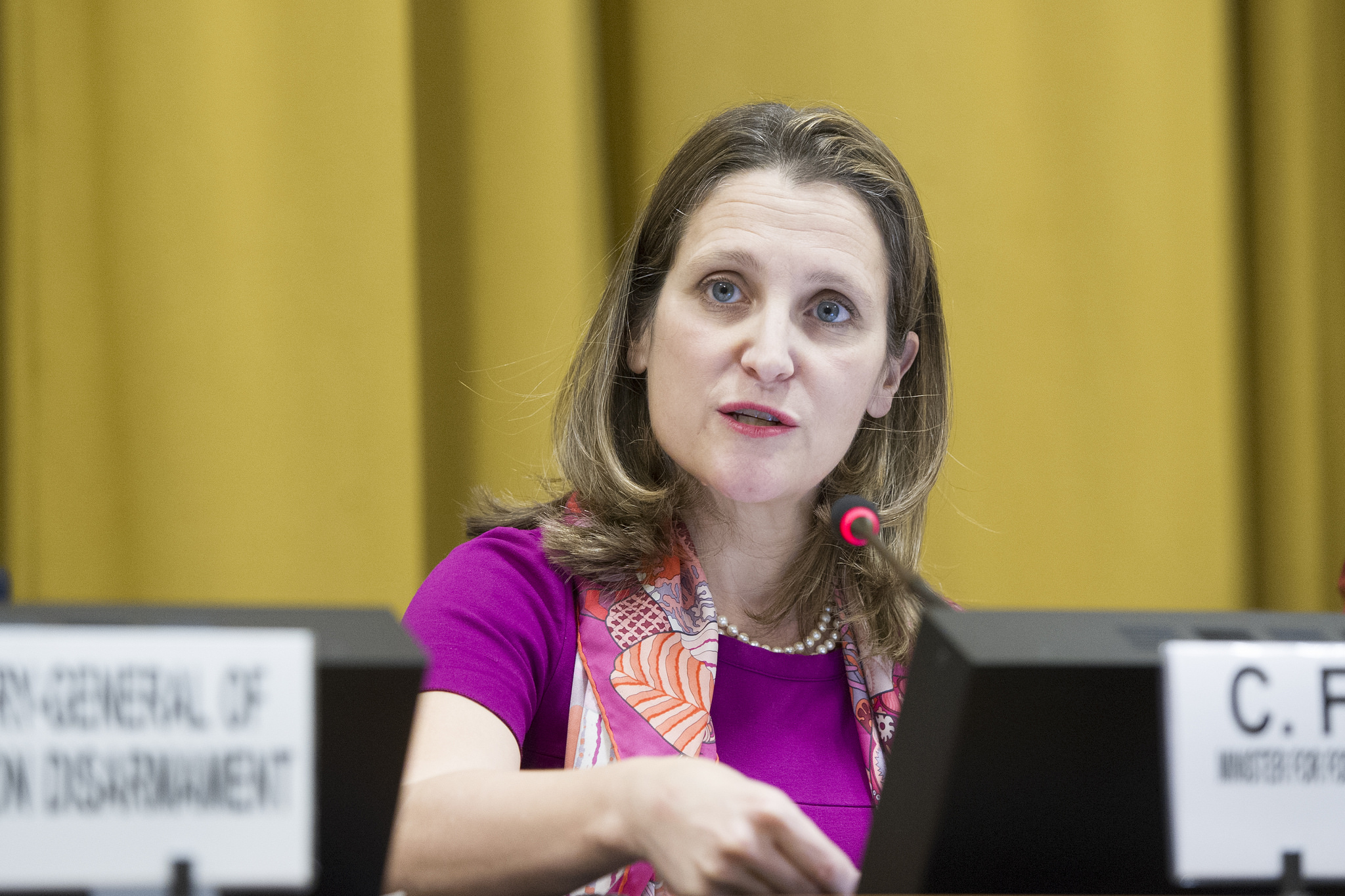Canada News
Freeland hails Canada-U.S. ties as shared border closes to travel, not trade

FILE: Chrystia Freeland, Minister of Foreign Affairs, Canada at the Conference on Disarmament, Palais des Nations. (Photo by Violaine Martin via UN Geneva/Flickr, CC BY-NC-ND 2.0)
WASHINGTON — Less than two years after their relationship had reached its lowest point in recent memory, Canada and the United States agreed Wednesday to close their shared border while allowing trade to continue, a remarkable display of foreign-policy solidarity amid the shared global peril of COVID-19.
The agreement, involving two countries that have already barred certain foreign visitors, followed several days of talks between Washington and Ottawa to find a mutually agreeable way to limit the spread of the virus without shutting down vital trade and commerce corridors, which in some cases are lifelines on both sides of the border.
“Travellers will no longer be permitted to cross the border for recreation and tourism,” said Prime Minister Justin Trudeau, who finalized the agreement in a phone call earlier in the day with President Donald Trump. Trudeau likened the measure to a geopolitical version of following sound public-health advice.
“In both our countries, we’re encouraging people to stay home, we’re telling our citizens not to visit their neighbours unless they absolutely have to,” he said. “This collaborative and reciprocal measure is an extension of that prudent approach.”
Essential travel will be allowed to continue in order to preserve critical supply chains, he added, which means shipping trucks will continue to cross the border to deliver food, fuel and medicine. Workers like health-care professionals who live and work on opposite sides will also be permitted to cross.
The closure will take effect within “hours or days,” said Deputy Prime Minister Chrystia Freeland, who noted that some $2.7 billion worth of goods traverse the border each day. Government officials also say exemptions will remain in place to ensure Canadians who are now in the United States are able to return home.
“Every country is really struggling with tremendous challenges at home. In that struggle, I think it is a very positive thing that Canada and the United States have managed to handle our border in this very collaborative and reciprocal way,” said Freeland.
There was “not even an atom, not a molecule” of pushback from the U.S. on the idea of maintaining the flow of trade, she added. “It says something about the partnership that we have in North America.”
Both Vice-President Mike Pence and the president himself had taken note of the fact that Canada approved the U.S.-Mexico-Canada Agreement before shuttering the House of Commons last week, Freeland said, framing it as evidence of shared faith in the importance of the economic ties between the two countries.
Trump suggested the travel ban would likely be in place for about a month. After which, “hopefully, we’ll be in great shape,” he told a White House briefing.
“It was just something we thought would be good for both countries,” the president said — a remarkable sentiment for a world leader whose “America First” rallying cry, disdain for free trade, border-wall promises and stay-home foreign-policy preferences have helped forge his reputation as a self-interested isolationist.
Before Wednesday’s White House briefing was over, however, the president of old was on full display, defending his tweets describing the novel coronavirus as the “Chinese virus” and laughing off any suggestion that he would be willing to ease punishing tariffs on foreign imports, which particularly target China.
Indeed, not everyone is taking the goodwill for granted.
The Canadian American Business Council issued an email Wednesday urging members to submit testimonials about the importance of commercial channels “to make the case that these measures not be broadened in the future to include commerce.”
“We are particularly looking for anecdotes from your companies that illustrate some of the critical functions of your cross-border business,” wrote CABC chief executive Maryscott Greenwood.
Public Safety Minister Bill Blair said officials in both countries are in the process of putting the ban in place, but he urged Canadians in the interim to honour the spirit of the agreement and resist the temptation to try to enter the United States if it’s not absolutely necessary.
Maintaining the flow of trade is not only about the current economic situation, but the challenges that are still down the road, he added.
“It’s also essential to maintain those supplies to facilitate the economic recovery that will come,” Blair said. “Many of our businesses are suffering and are going to suffer in the very difficult circumstances that we face in the near future, but it’s also important to maintain the economic conditions that will facilitate our recovery.”
Dan Ujczo, a trade lawyer in Columbus, Ohio, who specializes in Canada-U.S. issues, said business and trade interests in the two countries, along with governments at every level, have been working on solutions ever since the terrorist attacks of Sept. 11, 2001, exposed the absence of suitable contingency plans.
Since then, so-called “trusted trader” programs like Free and Secure Trade and Partners in Protection have advanced the idea that whatever the circumstances, cross-border commerce must be allowed to continue, he said.
“Companies enrolled in these programs likely will have continued access to ensure cross-border trade,” he said. “These plans and exercises have been developed over years and there is a good working relationship between the U.S. Department of Homeland Security and Public Safety Canada.”





















